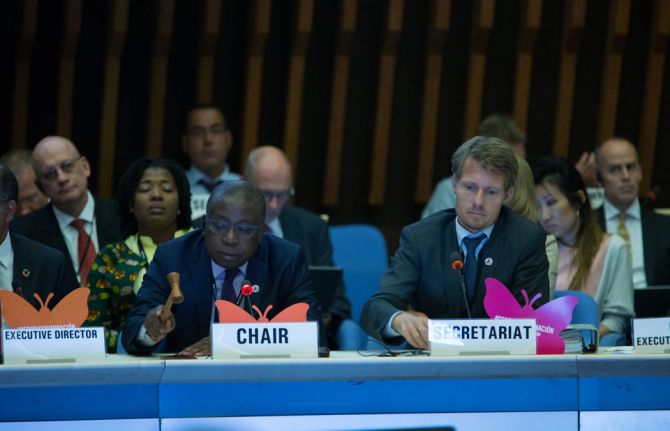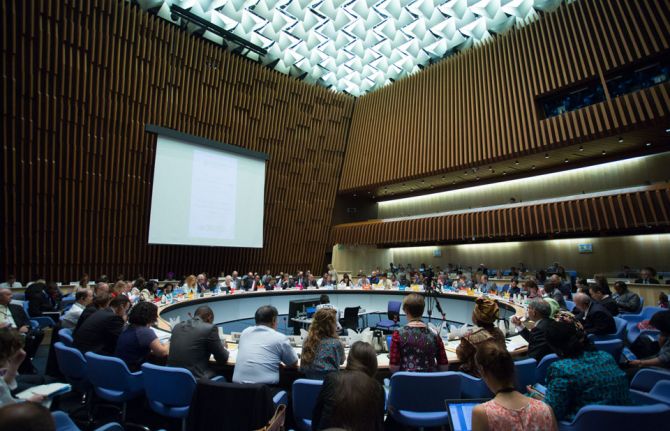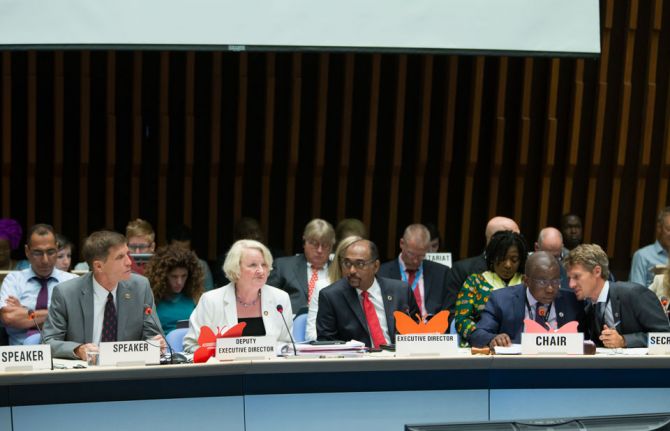




Press Release
UNAIDS Board seizes opportunities of change to deliver results
30 June 2017 30 June 2017Board members unanimously approve US$ 484 million budget for 2018–2019
GENEVA, 30 June 2017—UNAIDS’ 40th Programme Coordinating Board meeting has concluded in Geneva, Switzerland. Important decisions were taken on redefining the ways in which the Joint Programme works to deliver results efficiently and effectively and continues to advance global efforts to end the AIDS epidemic as part of the Sustainable Development Goals.
The Board affirmed the UNAIDS Joint Programme Action Plan as a way to progressively move towards a refined operating model. The Action Plan strengthens the coherence and effectiveness of UNAIDS’ support to countries and presents clear results and deliverables on joint working, financing, accountability and governance. The Board members also welcomed the final report of the Global Review Panel on the Future of the UNAIDS Joint Programme Model.
The Executive Director of UNAIDS, Michel Sidibé, presented his report to the Board, which centred around seizing the opportunities of change in order to deliver results. He talked about the importance of understanding a rapidly changing world, threats to global health security and the need to end AIDS by 2030.
“Ending AIDS is our imperative. We must not let the changes happening around us bend our trajectory or slow us down,” said Mr Sidibé. “We need to connect the dots across issues, mandates and organizations in new ways, confront obstacles with innovation and transformation, reinforce the centrality of community engagement, Fast-Track our efforts to reach everyone in need and leave no one behind.”
Mr Sidibé also talked Board members through the programme of reform he has led over the past 12 months to reposition the UNAIDS Secretariat and realign to support countries in a new political and financial environment while continuing to ensure maximum support for the work of the entire Joint Programme.
During the meeting, Mr Sidibé called on the Board to consider gender equality in the governance of UNAIDS. The Board invited all delegations to continue to encourage and support equal representation of women and men in the Board.
UNAIDS has increased the percentage of women in country director positions from 27% in 2013 to 48% in 2017 through the Gender Action Plan, an initiative championed by the Deputy Executive Director, Jan Beagle, who has been appointed as the new United Nations Under-Secretary-General for Management, a position she will take up in July 2017 after eight years with UNAIDS.
The Board approved UNAIDS’ 2018–2019 core budget of US$ 484 million. Attentive to the critical importance of a well-resourced Joint Programme, Secretariat and Cosponsors, the Board also encouraged donor governments to make multiyear contributions and release their contributions towards the 2016–2021 Unified Budget, Results and Accountability Framework (UBRAF) as soon as possible. The Board also urged UNAIDS to continue expanding its donor base and encourage new donors to make contributions towards the full funding of the 2016–2021 UBRAF.
During the meeting, important funding announcements to UNAIDS were made by Germany, which pledged to double its contributions to UNAIDS to €5 million in 2017 and 2018, and by Board Chair Ghana who also announced that Ghana would be doubling its contributions to UNAIDS to US$ 200 000, demonstrating Ghana’s commitment to advancing global efforts to end AIDS.
Ghana also announced that, despite facing persistent challenges, including funding and commodity gaps, it will be adopting the 2015 World Health Organization guidelines to test and offer immediate treatment to all people living with HIV in Ghana as part of efforts to achieve the 90–90–90 targets. Ghana is also stepping up its HIV prevention efforts and has trained more than 150 000 teachers in public schools to integrate HIV education into their lessons and has trained 300 000 children as peer educators across the country.
The Board dedicated the final day to a thematic session on the urgent need to scale up HIV prevention. Participants shared best practices from around the world, identified gaps and opportunities in HIV prevention programming and funding and looked at ways of expanding services to people at higher risk of HIV through scaling up primary HIV prevention programmes at the national and local levels.
Representatives of United Nations Member States, international organizations, civil society and nongovernmental organizations attended the three-day meeting, which was chaired by the Minister of Health of Ghana, Kwaku Agyemang-Manu, with the United Kingdom of Great Britain and Northern Ireland serving as Vice-Chair and Japan as Rapporteur.
At the invitation of the Executive Director, Lorena Castillo de Varela, the First Lady of Panama and UNAIDS Special Ambassador for AIDS in Latin America addressed the board about her work on HIV in Latin America and towards achieving Zero Discrimination globally.
The Leadership in the AIDS response address was made by the Chair of the Executive Board of UNITAID, Mr Celso Amorim. He emphasized innovation as key to progress on global health.
The UNAIDS Executive Director’s report to the Board and the Board’s decisions can be found at unaids.org
UNAIDS
The Joint United Nations Programme on HIV/AIDS (UNAIDS) leads and inspires the world to achieve its shared vision of zero new HIV infections, zero discrimination and zero AIDS-related deaths. UNAIDS unites the efforts of 11 UN organizations—UNHCR, UNICEF, WFP, UNDP, UNFPA, UNODC, UN Women, ILO, UNESCO, WHO and the World Bank—and works closely with global and national partners towards ending the AIDS epidemic by 2030 as part of the Sustainable Development Goals. Learn more at unaids.org and connect with us on Facebook, Twitter, Instagram and YouTube.
